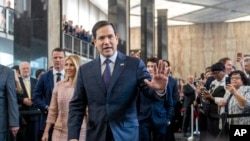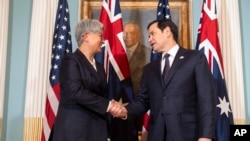Secretary of State Marco Rubio arrived at the State Department on Tuesday to a warm reception, marking his first visit since being sworn in as the United States’ top diplomat.
Rubio wasted no time hosting his counterparts from Australia, India and Japan — a move analysts say signals a focus on China.
Addressing hundreds gathered at the department's formal entrance, Rubio emphasized his commitment to a foreign policy centered on U.S. national interests.
“Anything that makes us stronger, or safer or more prosperous” will be our mission, Rubio said, adding that the U.S. will strive to avoid conflicts, while never compromising national security or sacrificing core values.
Rubio acknowledged that changes are inevitable but assured the crowd that “there will be changes, but the changes are not meant to be destructive. They're not meant to be punitive.”
The new secretary of state expressed gratitude to the American foreign service workforce and his desire to do something special in his new role.
“I want to thank you – all those who are serving overseas and abroad, some in places that are strong and stable, and others that are more tenuous and dangerous. ... I want to also thank the locally employed staff, the nationals of those countries who work with us,” Rubio said.
Following his debut at the State Department, Rubio met in the afternoon with foreign ministers from the Indo-Pacific Quad on Tuesday afternoon, including Indian External Affairs Minister Dr. Subrahmanyam Jaishankar, Australian Foreign Minister Penny Wong and Japanese Foreign Minister Iwaya Takeshi.
The foreign ministers of Japan, Australia and India were in Washington to attend President Donald Trump’s inauguration.
Later, Rubio and his counterparts released a statement.
“Our four nations maintain our conviction that international law, economic opportunity, peace, stability and security in all domains including the maritime domain underpin the development and prosperity of the peoples of the Indo-Pacific. We also strongly oppose any unilateral actions that seek to change the status quo by force or coercion,” it said.
“We are committed to strengthening regional maritime, economic, and technology security in the face of increasing threats, as well as promoting reliable and resilient supply chains,” it added.
Some analysts say that while there are concerns about the perceived "retrenchment" from international affairs and "isolationism" in U.S. foreign policy under Trump, there is also some confidence that the U.S. will remain committed to regional frameworks with its allies and partners.
“I think this meeting among the four ministers of the Quad countries is a clear signal that the U.S. is not abandoning its regional coalition of allies and partners in countering China’s rise,” Yun Sun, director of the China program at the Stimson Center, told VOA on Tuesday.
Others noted that Rubio's views on China differ from Trump's expectations. They said that, as secretary of state, Rubio will need to navigate how to engage with the Beijing government.
"Marco Rubio has a much larger track record of opposing China, not dealing with China and supporting human rights around the world," William Pomeranz, a senior fellow at the Woodrow Wilson Center, told VOA.
"I think that China will basically try to reengage with Donald Trump, but not with Marco Rubio."
Earlier on Tuesday, Russian President Vladimir Putin and Chinese President Xi Jinping held a video call in which they discussed how to foster ties with Trump, prospects for a deal to end the war in Ukraine, and Moscow's support for Beijing's stance on Taiwan — further solidifying a strategic partnership between Russia and China that continues to raise concerns in the West.
Neither Rubio nor his Quad counterparts responded to shouted questions about China or the virtual call between Putin and Xi.
Rubio was unanimously confirmed as secretary of state on Monday, becoming the first member of Trump's Cabinet in his second administration.
During his confirmation hearing last Wednesday, Rubio outlined key foreign policy challenges, including threats from the Chinese Communist Party, along with mass migration, fentanyl and violent criminals in the Western Hemisphere.
He also warned of dictators in Moscow, Tehran and Pyongyang spreading instability, while aligning with and funding radical terror groups.

